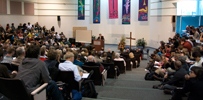Alumna Sarah Crowley Chestnut Wins Prestigious Poetry Prize

The Evangelical Press Association recently awarded Regent alumna Sarah Crowley (MCS 2009) the 2018 Higher Goals Awards First Prize in Poetry for her poem, "Simon Hears Tell of the Crucifixion." The poem appeared in CRUX, Regent's quarterly journal of Christian Thought and Opinion. Her poem was chosen from wide range of submissions, many of which were authored by esteemed poets.
Sarah now lives with her husband Joshua (MCS 2009) and two children near Boston, where she and Josh work at L'Abri Fellowship. She recently answered a few of our questions about the poem and her work as a poet.
To read Sarah's award-winning poem, click here.
What, in particular, inspired this poem?
Looking closely at moments between Peter and Jesus recounted in the Gospels and reading these slowly and with imagination were not only the inspiration for several poems about Simon Peter, they were first a way of praying that helped me see Jesus—and also myself—more clearly. I have slowly been adding to the number of these "Peter poems" and this is one of the additions. I guess you could say I got hung up on the fact that Peter did what he said he'd never do: abandon Jesus. And my imagination wandered with him into that time between the crucifixion and resurrection.
How do you manage to write poetry between raising kids and working?
During my time at Regent, both Loren Wilkinson and Maxine Hancock were significant influences on me, and little gems of wisdom they shared about the creative process and the challenge of honouring multiple vocations (in my case, marriage, child-rearing, poetry, L'Abri work) helped, and continue to help me, through seasons when I don't manage to pick up a pen. Loren (not surprisingly!) spoke of the way that poems need to "compost"—meaning, we need to trust that much is happening to make a poem even when it seems nothing is happening.
Any gardener will tell you there is much that can be done to nurture or inhibit the making of good compost but the point is patience—both with myself and with the creative process. At L'Abri, we talk about the paradox of "active passivity" in our life with God, and I think that says it well.
Right after we got married I was reeling with all the change. I was crying to Maxine about not being able to write poems. She wisely and sympathetically told me that she had come to think of major life changes as landslides over the "little artesian well of creativity." She told me, "in time, the water will find its way to the surface again." This was a deeply hopeful image to me and—like the image of compost—ultimately pointed me, and my poetic endeavors, back to a loving relationship with Christ.
I didn't actually write much until about a year and a half ago, when my friend Mary Romero Ferguson (MCS 2008), a friend during Regent years, and I went to a writing retreat. Taking a weekend away jumpstarted my writing life and I received a gem of wisdom from the poet we worked with there. I had told her that I wanted to write poems about my children, but was afraid it would be sentimental mush. She said firmly, "Sarah, if you are not risking sentimentality, you are not doing your job." She put her finger on the self-consciousness and ego that was making me care too much about how my poems would be received before I had even written them!
Can you share any specifics of how you keep writing?
Mary and I now call each other to a "7 in 7," sending each other a new rough draft each day for seven days in a row. This has probably been the most helpful way to generate new work in a season of life when sitting down to write daily for any length of time is just not feasible. Mary and I call this "writing in the margins of life" and that's exactly what it is. You could say I've embraced a "something is better than nothing" ethic. This has been the most helpful counter to a perfectionism that would otherwise keep me from doing any number of worthwhile things.
To start reading poetry, what would you suggest?
I think one thing people need to know about reading poems is that poems—good poems—do not first tell you something, but rather create a space to inhabit. There is, in this sense, a hospitality to good poems, and if you are going to receive anything from a poem, you must first enter into the "house" of the poem and receive what it has to offer. Sometimes the space a poem invites you to dwell in is a difficult one: you may be given a hard, wooden chair (or no chair) instead of plush sofa to sit on. I don't want to take this metaphor too far, but I think that this way of reading poems—dwelling in them—can furnish us with language that helps us inhabit our own lives more fully.
What have you been reading recently?
Currently I've been spending time with Joy: 100 poems, edited by Christian Wiman. It's a volume of modern poems, collected from international poets, and its aim is to learn something of the nature of joy that the poems bear witness to. Wiman describes this joy as "the only inoculation against the despair to which any sane person is prone."
There is nothing sentimental about this collection; these are poems that make me wrestle with goodness in the same way I wrestle with all that is so jarringly wrong in this world. This is a collection that helps me lament evil and delight in good, and praise the God who is present to us in all of life's circumstances.
Where have you been since you graduated from Regent?
After Regent, Joshua and I worked in East Vancouver for three years. We were very involved with Grandview Calvary Baptist Church and enjoyed deep friendships within that community. We had hoped we might settle near my family in Mariposa, California but unfortunately, our efforts turned into a season of proverbial "dead ends," vocationally speaking.
During that time, my long-time friend Nickaela Fiore-Keyes (DPCS 2007) encouraged us to consider coming to L'Abri. Both Joshua and I were animated by L'Abri's vision of life and work being anchored in hospitality and honest conversation about the truthfulness of Christianity, but neither of us had actually been to one. We soon packed up our old mini-van and moved across the country to be students at the Southborough L'Abri. And we stayed.
Interested in other fine poetry and award-winning articles for stimulation and nourishment? Read an issue of CRUX, Regent's quarterly journal of thought and opinion—this one with articles by Ralph Wood and Loren Wilkinson celebrating books and Bookstore-hero Bill Reimer's exceptional legacy. Interested in subscribing to CRUX? To do so, click here.




